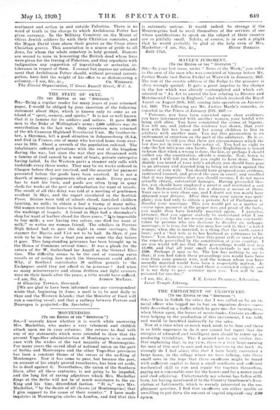MA ULE'S JUDGMENT.
[To THE EDITOR OF THE " SPECUTOR.") Sin,—In your last issue, under " News of the Week," you refer to the case of the man who was convicted of bigamy before Mr. Justice Maule (not Baron Parke) at Warwick in January, 1857. The text of the caustic address of the Judge to the prisoner is often wrongly quoted. It gavs• a great impetus to the change in the law which was already contemplated and which cul- minates' in "An Act to amend the law relating to Divorce and Matrimonial Causes in England," and which received the Royal Assent on August 28th, 1857, coming into operation on January 1st, 1858. The following are Mr. Justice Maule's remarks, as reported in the Times of January 27111, 1857 :— " Prisoner, you have been convicted upon clear evidence; you have intermarried with another woman, your lawful wife being still alive. You have committed the crime of bigamy. You tell me, and indeed the evidence has shown, that your first wife left her home and her young children to live in adultery with another man. You say this prosecution is akt instrument of extortion on the part of the adulterer. Be it 1,n. I am bound to tell you that these are circumstances which the law does not in your case take notice of. You had no right In take the law into your own hands. Every Englishman is bound to know that when a wrong is done, the law, or perhaps I should rather say the constitution, affords a remedy. Now, listen to me, and I will tell you what you ought to have done. Mime- diately you heard of your wife's adultery you should have gone to an attorney and directed him to bring an action against the seducer of your wife. You should have prepared your evidence. instructed counsel, and proved the ease in court; and recollect that it was imperative that you should recover, I do not menu actually obtain, substantial damages. Having proceeded thus far, you should hare employed a proctor and instituted a suit in the Ecclesiastical Courts for a divorce a mensa et thorn. Your case is a very clear one, and I doubt not you would have obtained your divorce. After this step your course was quite plain; you had only to obtain a private Act of Parliament lc dissolve your marriage. This you would get as a matter ol eourse upon payment of the proper fees and proof of the facts; YOU might then have lawfully married again. I perceive, prisoner, that you appear scarcely to understand what I ant saying to you, but let like assure you these steps are constantly taken by persons who are desirous to dissolve an unhappy marriage; it is true, for the wise man has said it, that a hated woman, when she is married, is a thing that the earth cannot bear,' and a 'had wife is to her husband as rottenness to his bones.' You, however, must bear this great evil, or must adopt the remedy prescribed by the constitution of your country. I see you would tell me that these proceedings would cost poi £1,000, and that all your small stock-in-trade is not worth £100. Perhaps it may so he. The law has nothing to say to that; if you had taken these proceedings you would hare been free front your present wife, and the woman whom you have secondly married would have been a respectable nkatron. As you have not done £0, you stand there a convicted culprit, and it is my duty to pass sentence upon you. You will be im- prisoned for one day."
—I am, Sir, &c., J. E. LITTON PICKERING, Librarian.
Inner Temple Library.










































 Previous page
Previous page